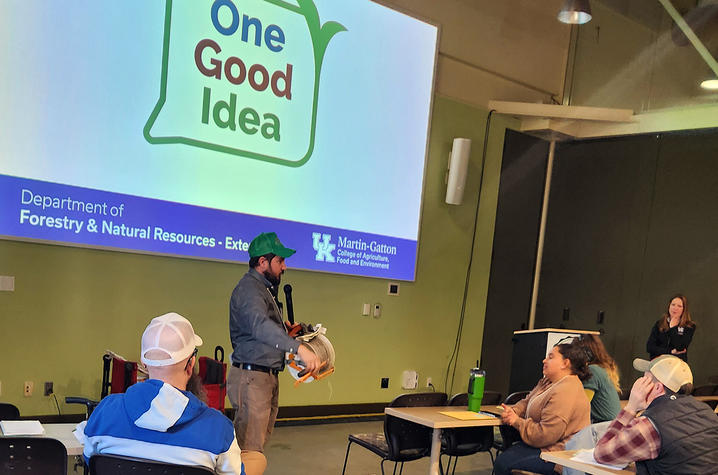UK encourages on-farm conservation through conversations at One Good Idea Shop Talks

LEXINGTON, Ky. (March 27, 2025) — More Kentucky farmers are discovering the One Good Idea Shop Talks, a webinar program designed to create peer-to-peer dialogue around row crop and livestock conservation efforts. The free virtual meet-ups are supported by the University of Kentucky Cooperative Extension Service — allowing producers to ask questions and share their experience in implementing various farm practices.
Amanda Gumbert, extension water quality specialist at the UK Martin-Gatton College of Agriculture, Food and Environment, is excited that shop talk participation is growing. This encouraged her and program collaborators to add a pre-plant series to this year’s webinar lineup.
“This past winter, Good Idea Shop Talks included discussions on how to quantify the effectiveness of conservation practices, how to help undercapitalized young farmers use conservation while competing in the current ag financial environment and how to increase efficiency and diversify income streams on the farm," Gumbert said. “Farmer participants encouraged us to add a spring line-up to keep the conversations going. We also have a pre-harvest session that will be offered later this summer.”
Gumbert mentioned that the webinars provide farmers with a candid platform to discuss their practices and motivations with conservation-minded peers.
“The shop talks can be compared to a support group for conservation practice adopters,” Gumbert said. “Farmers often receive criticism for trying new conservation efforts, but the shop talks provide a judgement-free space to talk about the pressures and barriers for adopting new methods.”
Loretto, Kentucky farmer Cody Rakes, a One Good Idea strategic board member who regularly participates in the shop talks, said he pitched a question to the group on cover crop seeding and termination strategies. Rakes said he appreciates the broad scope of expertise of farmers from different regions and points in their farming careers.
“You never know how the conversation will go,” Rakes said, “but it’s always fruitful. Listening to farmers in this setting shows you that the real solutions lie in what farmers are actually doing.”
Rakes also recalled a conversation on grazing strategies where he shared how he stockpiles fescue for fall feeding to allow for winter grazing. This was a routine practice for him, but those outside of Kentucky found it quite novel.
“The approach allows us to be honest, open and for ideas to be shared easily,” Rakes said. “Sometimes you feel you are in no-man's land when considering new approaches, but the shop talks provide comradery, encouragement and networking. It’s inspiring to be with like-minded people.”
The previous March webinars focused on the future of conservation agriculture and exploring how premiums could be captured for growing GMO corn and soybeans in a sustainable/regenerative way.
Gumbert encourages more Kentucky farmers to join in the conversations and to pitch a question for the last webinar in the series, scheduled for March 27. Producers can learn more and register by visiting https://goodideafarm.org/shop-talks/.
This project is funded by the Foundation for Food & Agriculture Research (FFAR) and the Walton Family Foundation.
About the Walton Family Foundation
The Walton Family Foundation is at its core, a family-led foundation. Three generations of the descendants of our founders, Sam and Helen Walton, and their spouses, work together to lead the foundation and create access to opportunity for people and communities. We work in three areas: improving education, protecting rivers and oceans and the communities they support, and investing in our home region of Northwest Arkansas and the Arkansas-Mississippi Delta. To learn more, visit waltonfamilyfoundation.org.
As the state’s flagship, land-grant institution, the University of Kentucky exists to advance the Commonwealth. We do that by preparing the next generation of leaders — placing students at the heart of everything we do — and transforming the lives of Kentuckians through education, research and creative work, service and health care. We pride ourselves on being a catalyst for breakthroughs and a force for healing, a place where ingenuity unfolds. It's all made possible by our people — visionaries, disruptors and pioneers — who make up 200 academic programs, a $476.5 million research and development enterprise and a world-class medical center, all on one campus.




